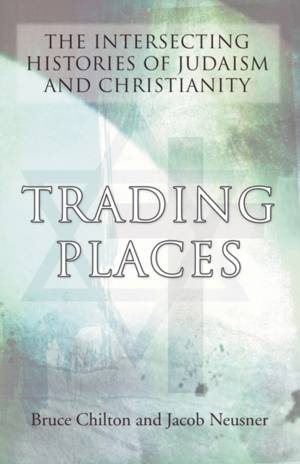
- Afhalen na 1 uur in een winkel met voorraad
- Gratis thuislevering in België vanaf € 30
- Ruim aanbod met 7 miljoen producten
- Afhalen na 1 uur in een winkel met voorraad
- Gratis thuislevering in België vanaf € 30
- Ruim aanbod met 7 miljoen producten
Zoeken
Trading Places
The Intersecting Histories of Judaism and Christianity
Bruce Chilton, Jacob Neusner
Paperback | Engels
€ 48,95
+ 97 punten
Omschrijving
'Trading Places' turns on its head the usual scholarly consensus that early Christianity and Rabbinic Judaism run parallel. These two great traditions, argue Bruce Chilton and Jacob Neusner, intersected and ultimately traded places during the first four centuries of the Common Era. In this, the authors offer a bold new way of interpreting Western religious history. Politically, for example, the private and communal Christianity became public and dominant after the conversion of Constantine, whereas the formerly public and political Rabbinic Judaism became private and communal. But Christianity and Judaism traded places in other ways as well, such as their values, their teleology, and their understandings of history. Ultimately Judaism found success in making the best of what it could not change, Chilton and Neusner assert, whereas Christianity entered public discourse in a bid to transform the world. 'Trading Places' is accompanied by a sourcebook so that the critical passages from primary sources within each tradition can be scrutinized. Professors Chilton and Neusner also provide helpful commentaries to illuminate the context for and significance of these sources.
Specificaties
Betrokkenen
- Auteur(s):
- Uitgeverij:
Inhoud
- Aantal bladzijden:
- 290
- Taal:
- Engels
Eigenschappen
- Productcode (EAN):
- 9781592446445
- Verschijningsdatum:
- 8/04/2004
- Uitvoering:
- Paperback
- Formaat:
- Trade paperback (VS)
- Afmetingen:
- 144 mm x 217 mm
- Gewicht:
- 358 g

Alleen bij Standaard Boekhandel
+ 97 punten op je klantenkaart van Standaard Boekhandel
Beoordelingen
We publiceren alleen reviews die voldoen aan de voorwaarden voor reviews. Bekijk onze voorwaarden voor reviews.











